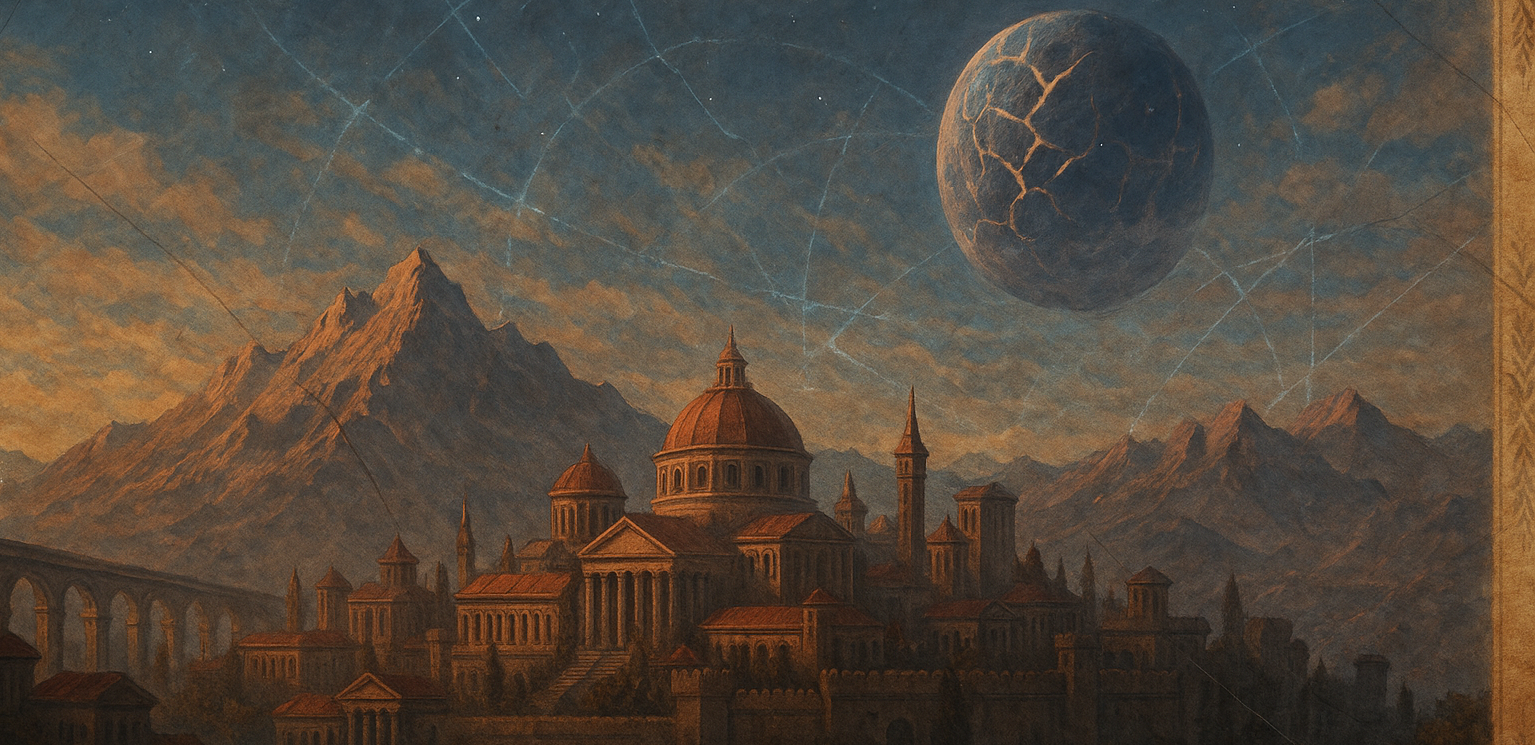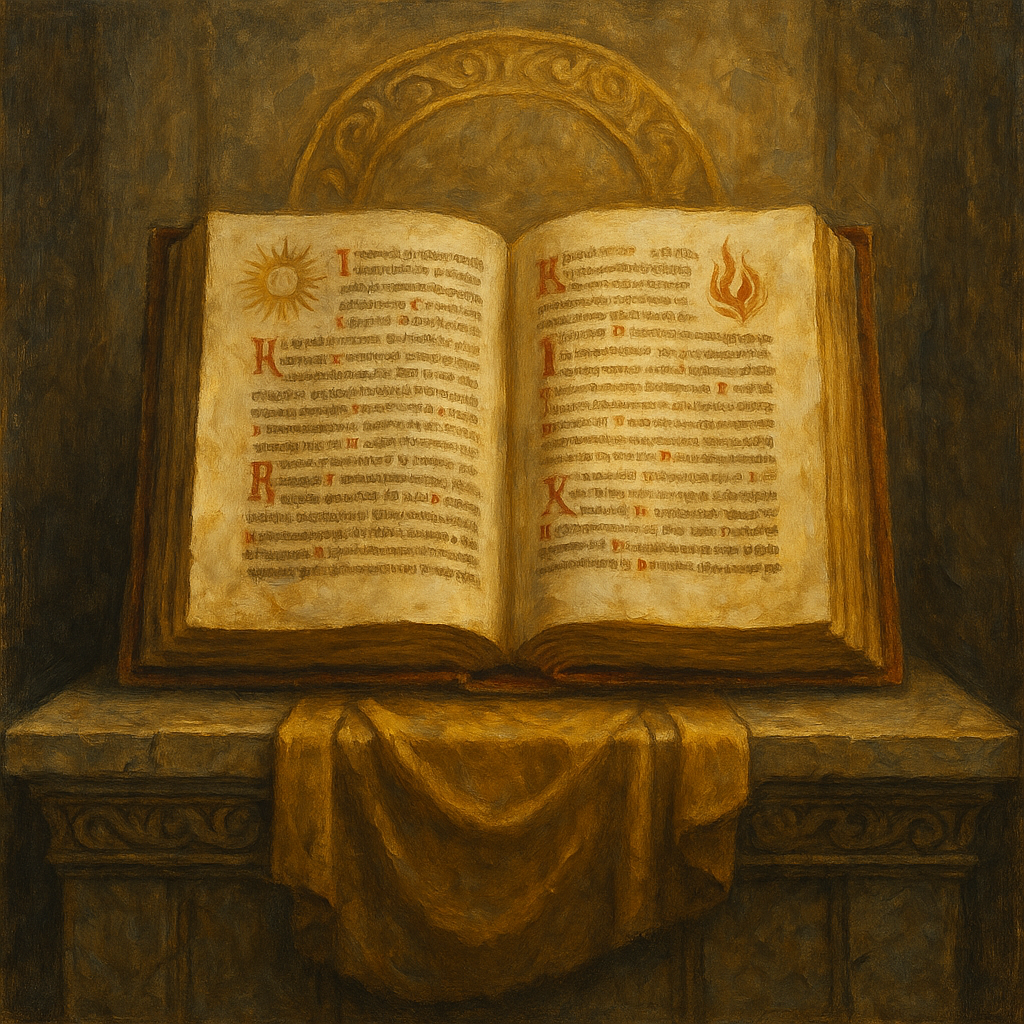The Litany of Dawn
“As the sun rose above the Rift and darkness fled, so too shall the faithful rise and shadows scatter.”
The Litany of Dawn is more than parchment and ink — it is the heartbeat of the Empire’s faith, the song that stilled a terrified world. In the trembling days after the Rift split heaven and earth, this sacred text rose like the morning star to pierce the gloom. At once scripture, creed, and political manifesto, it crowned Sol Invicta as sovereign of light and life, and the Emperor as his chosen emissary. Each line blazes with purpose, its gold and scarlet illuminations a mirror of sunrise itself. To behold it is to feel the weight of destiny, as though the dawn itself rests upon your hands.
Purpose
The Litany was written to calm a people who saw the skies torn asunder and believed the end had come. Its verses reframed the Rift as divine trial, reminding the faithful that light could never truly be overcome. In binding faith to state, it solidified the Emperor’s authority not just as ruler, but as the living agent of Sol Invicta’s will. It soothed the devout, disciplined the skeptical, and excluded the defiant — drawing a bright line between the chosen and the forsaken.
Document Structure
Clauses
- Book of Light: A poetic tapestry of hymns and parables, recounting the sun’s endless battle against darkness. Each passage designed to elicit awe, even tears, among listeners.
- Book of Order: Stern decrees binding ruler and ruled in sacred contract, weaving law and faith into one unbreakable fabric.
- Book of Vigil: Rituals to greet each dawn and mourn each dusk, so the faithful remember their place in the eternal cycle of day and night.
Its margins brim with radiant sigils and miniature prophecies, each echoing the grand narrative of light’s triumph.
Caveats
The Litany is not all comfort. Its final stanzas speak of famine, plague, and exile for those who abandon its rites. It explicitly limits Riftborn participation in certain ceremonies, marking them as outsiders. Even the clergy treat these passages with caution, often softening their recitation during public ceremonies.
References
The Litany leans on the Codex Exilia as its legal sibling, transforming statutes into sacred principles. It also appropriates older Rift prophecies, bending them into affirmations of Imperial destiny and Sol Invicta’s supremacy.
Publication Status
Copies can be found in temples, homes, and marketplaces — yet the original manuscript remains under lock and key within the Basilica Solis. Only the High Priesthood may touch it, and only by dawn’s first light.
Legal status
The Litany is enshrined in Imperial law, its authority unquestioned for centuries. To recite its opening lines in court is to summon the Empire’s full moral and legal weight.
Historical Details
Background
It was written at the height of despair, when even the Senate chamber fell silent and the streets of Nova Roma were choked with ash and whispers of apocalypse. The Rift had torn open the sky, its strange moons looming above, and fear darkened every household. In that void of courage and faith, High Solar Priestess Cassiana Aurea ascended the steps of the Basilica Solis, her voice ringing like a clarion across the weeping crowds. By dawn she had begun to dictate the verses that would become the Litany, stitching together prophecy, law, and devotion into a single flame of hope. Witnesses say that as she spoke, the sun broke through the Rift-born clouds and gilded the city, and many swore they saw the light itself dance upon her brow. The Litany was thus born of terror and defiance, a testament that even the deepest night must bow to the dawn.
History
Cassiana Aurea first read it aloud on the steps of the Basilica Solis, her words carrying over a sea of frightened citizens who clung to each syllable like a lifeline. The manuscript spread like wildfire, carried by messengers and scribes who braved Rift storms to deliver it to every corner of the Empire. Each copy was guarded as a sacred relic, copied by candlelight and kissed before it was sealed. Over the centuries, heretical versions emerged—some adding verses, others twisting its meaning to favor dissenters—but each was met with the Empire’s fury, erased from memory through flame, steel, and silence. The original, however, endured unchallenged, as luminous as the dawn itself.
Public Reaction
The faithful fell to their knees weeping, many claiming to feel warmth on their skin as the words were spoken. Riftborn muttered and seethed at its exclusionary tone, yet even they dared not openly oppose it while the crowds chanted its verses. Skeptics and scholars alike marveled at its ability to restore order where legions and decrees had failed. Among the common folk it became a talisman, verses scratched onto doorframes and whispered to children in the dark.
Legacy
Its verses are so deeply woven into Imperial culture that children recite them before they can write their own names. Carved into the very stones of temples, etched into banners carried into war, and sung over the dying, the Litany of Dawn endures as the Empire’s most sacred utterance. Even in distant provinces where Sol Invicta’s light seems faint, its opening line is still spoken at dawn — a promise that no matter the shadow, the sun will always rise again.
Term
Eternal — minor amendments have been penned in the margins across centuries, but the heart of the text remains untouched.




Comments